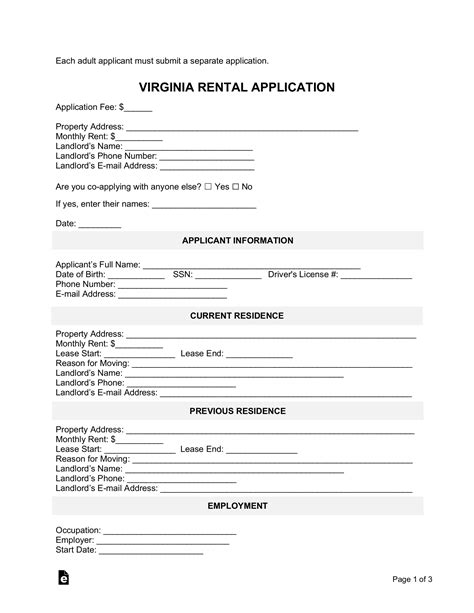Finding the perfect rental property in Virginia can be a daunting task, especially with the numerous requirements and regulations that come with it. As a prospective tenant, it's essential to understand the Virginia rental application process and requirements to ensure a smooth and successful experience.
The Importance of Understanding Rental Applications
In Virginia, rental applications serve as a crucial document for both landlords and tenants. It helps landlords assess potential tenants' creditworthiness, rental history, and employment status, while also providing tenants with an opportunity to showcase their qualifications and secure their desired rental property. By understanding the rental application process and requirements, tenants can avoid common mistakes, increase their chances of approval, and ultimately find their ideal rental home.
Types of Rental Applications in Virginia
There are two primary types of rental applications in Virginia: the standard rental application and the online rental application. The standard rental application is a physical document that tenants fill out and submit to the landlord or property manager, while the online rental application is a digital version that can be completed and submitted through a website or mobile app.
Virginia Rental Application Requirements
To apply for a rental property in Virginia, tenants typically need to provide the following documents and information:
- Identification: A valid government-issued ID, such as a driver's license or passport, to verify the tenant's identity.
- Proof of Income: Pay stubs, W-2 forms, or tax returns to demonstrate the tenant's income and employment status.
- Credit Report: A credit report from one of the three major credit bureaus (Equifax, Experian, or TransUnion) to assess the tenant's creditworthiness.
- Rental History: A rental history report or references from previous landlords to evaluate the tenant's rental behavior.
- Employment Verification: A letter or contact information for the tenant's employer to confirm their employment status.
- Social Security Number: The tenant's Social Security number to run a credit check and verify their identity.

Additional Requirements for Virginia Rental Applications
Some landlords or property managers may require additional documentation or information, such as:
- Pet Information: If the tenant has a pet, they may need to provide information about the pet's breed, size, and vaccination history.
- Vehicle Information: If the tenant has a vehicle, they may need to provide information about the vehicle's make, model, and registration.
- Criminal Background Check: Some landlords or property managers may require a criminal background check as part of the rental application process.
How to Fill Out a Virginia Rental Application
To fill out a Virginia rental application, tenants should follow these steps:
- Read the Application Carefully: Before starting the application, tenants should read it carefully to ensure they understand the requirements and instructions.
- Gather Required Documents: Tenants should gather all required documents and information before filling out the application.
- Fill Out the Application Accurately: Tenants should fill out the application accurately and truthfully, providing all required information and documentation.
- Submit the Application: Once the application is complete, tenants should submit it to the landlord or property manager, either in person, by mail, or online.
Tips for Tenants
To increase their chances of approval, tenants should:
- Check Their Credit Report: Before applying for a rental property, tenants should check their credit report to ensure there are no errors or surprises.
- Gather All Required Documents: Tenants should gather all required documents and information before filling out the application to avoid delays.
- Be Honest and Accurate: Tenants should be honest and accurate when filling out the application, providing all required information and documentation.
Common Mistakes to Avoid
Tenants should avoid the following common mistakes when filling out a Virginia rental application:
- Inaccurate or Incomplete Information: Providing inaccurate or incomplete information can lead to delays or even rejection.
- Insufficient Documentation: Failing to provide required documentation can also lead to delays or rejection.
- Late Submission: Submitting the application late can reduce the tenant's chances of approval.
Virginia Rental Application Laws and Regulations
Virginia has several laws and regulations that govern the rental application process, including:
- Fair Housing Act: Prohibits discrimination based on race, color, national origin, religion, sex, familial status, or disability.
- Virginia Fair Housing Law: Prohibits discrimination based on race, color, national origin, religion, sex, familial status, disability, or age.
- Virginia Residential Landlord and Tenant Act: Regulates the rental application process, including the use of rental applications and the disclosure of information.

Gallery of Virginia Rental Application Forms






Frequently Asked Questions
What is the typical turnaround time for a rental application in Virginia?
+The typical turnaround time for a rental application in Virginia is 24-48 hours, but it may vary depending on the landlord or property manager.
Can I apply for a rental property in Virginia if I have a poor credit score?
+Yes, you can still apply for a rental property in Virginia with a poor credit score, but you may need to provide additional documentation or pay a higher security deposit.
What is the maximum amount of security deposit a landlord can charge in Virginia?
+In Virginia, the maximum amount of security deposit a landlord can charge is two months' rent.
By understanding the Virginia rental application process and requirements, tenants can navigate the process with confidence and increase their chances of approval. Remember to read the application carefully, gather all required documents, and fill out the application accurately and truthfully. Good luck with your rental application!
